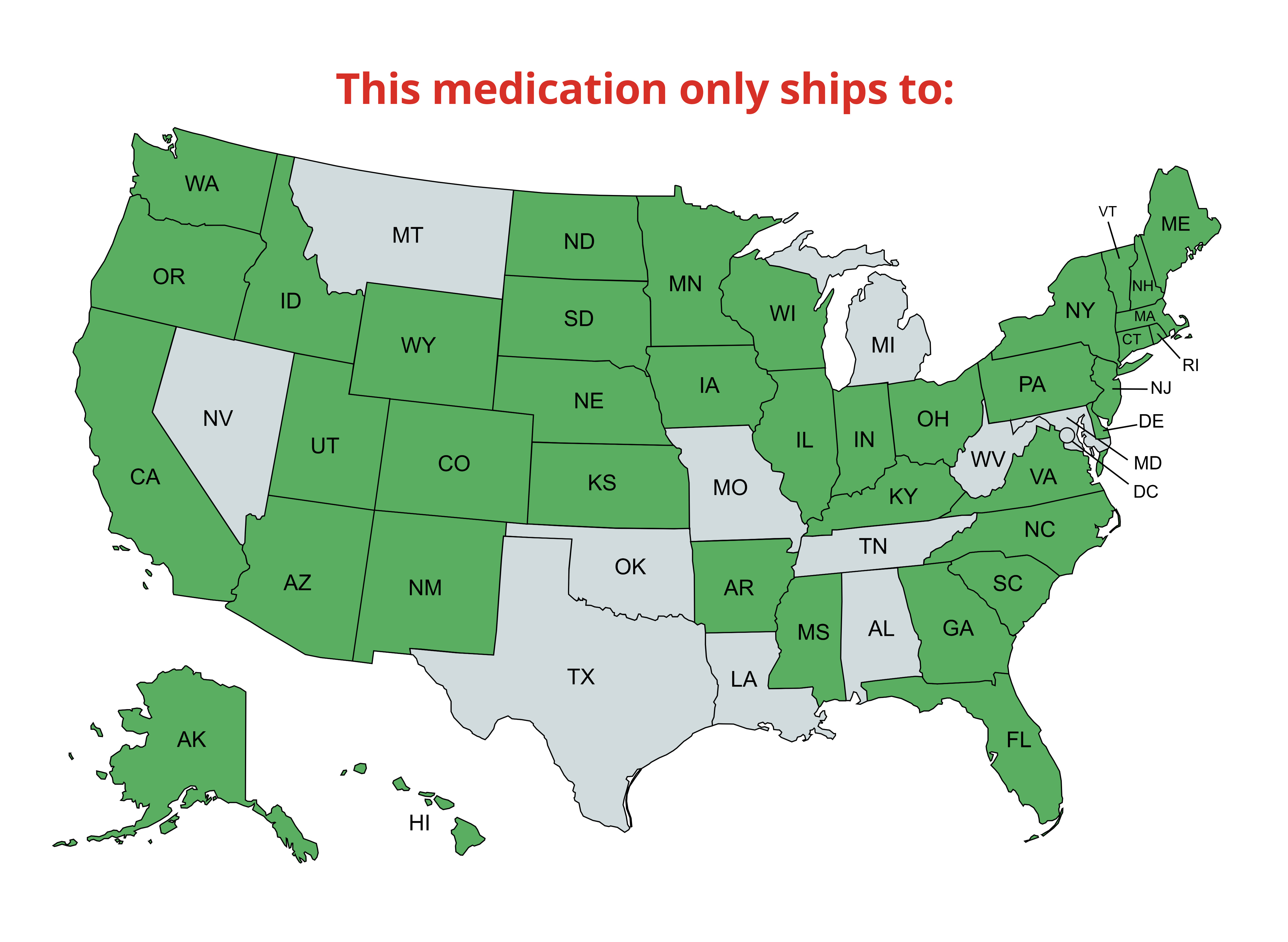

OstiFen (Carprofen) Caplets for Dogs
OstiFen (Carprofen) Caplets for Dogs 75mg are a potent and effective solution for managing your dog's pain and inflammation, particularly in cases of osteoarthritis or post-operative recovery.
As dogs age or recover from surgery, they often suffer from discomfort that hinders their quality of life. OstiFen is specifically formulated to provide targeted relief, helping your dog regain mobility and enjoy a more active, pain-free lifestyle. Unlike other pain management options, OstiFen offers fast-acting relief with a high degree of safety and efficacy.
Whether your dog is suffering from chronic pain due to arthritis or needs short-term relief following surgery, OstiFen is designed to meet these needs effectively.
Prescription items are NON-RETURNABLE and NON-REFUNDABLE.
Please note that the product may arrive in a Hardy Paw Pharmacy vial, manufacturer packaging is shown for reference.
Benefits of OstiFen Caplets
-
Targeted Relief: Quickly reduces inflammation and pain associated with osteoarthritis and post-operative recovery.
-
Enhanced Mobility: Restores your dog's ability to move comfortably, improving their overall quality of life.
-
Long-Lasting Effects: Provides up to 24 hours of pain relief with a single dose, ensuring consistent comfort.
-
Veterinarian Recommended: Trusted by professionals for its proven efficacy and safety profile.
-
Cost-Effective: High-quality pain management at an affordable price, suitable for long-term use.
-
Easy to Administer: Available in caplet form for easy administration, ensuring proper dosage.
OstiFen Ingredients
-
Primary Ingredient: Carprofen 75mg
-
Secondary Ingredients: Corn starch, microcrystalline cellulose, hydroxypropyl cellulose, and magnesium stearate.
Carprofen Dosage and Administration
-
Always provide the Client Information Sheet with a prescription.
-
Carefully consider the potential benefits and risks of OSTIFEN and other treatment options before deciding to use OSTIFEN.
-
Use the lowest effective dose for the shortest duration consistent with individual response.
-
The recommended dosage for oral administration to dogs is 2 mg/lb (4.4 mg/kg) of body weight daily.
-
The total daily dose may be administered as 2 mg/lb of body weight once daily or divided and administered as 1 mg/lb (2.2 mg/kg) twice daily.
-
To control postoperative pain, administer approximately 2 hours before the procedure.
-
Caplets are scored and dosage should be calculated in half-caplet increments.
Frequency
Administer OstiFen (Carprofen) Caplets once daily, either as a single dose or divided into two equal doses. But always follow your veterinarian’s specific recommendations.
Consistency
For optimal results, administer OstiFen at the same time each day to maintain consistent levels of medication in your dog's system. This consistency ensures sustained relief from pain and inflammation.
OstiFen Side Effects
While OstiFen (Carprofen) is generally safe and well-tolerated, some dogs may experience side effects. These side effects can range from mild to severe, and it’s important to monitor your dog closely while they are taking this medication.
Common Side Effects:
-
Gastrointestinal Upset: Vomiting, diarrhea, decreased appetite, and stomach pain.
-
Lethargy: Unusual tiredness or sluggishness.
-
Increased Thirst and Urination: Noticeable changes in drinking and urination habits.
Less Common but Serious Side Effects:
-
Liver Issues: Signs may include yellowing of the eyes or gums (jaundice), dark urine, or pale stools.
-
Kidney Issues: Increased thirst, changes in urination frequency, or reduced urination.
-
Bleeding or Ulcers: Symptoms might include black, tarry stools or blood in vomit.
-
Allergic Reactions: Swelling of the face or limbs, hives, and difficulty breathing.
If you observe any of these side effects, especially the more serious ones, discontinue use and consult your veterinarian immediately. Regular monitoring and communication with your vet can help manage these risks and ensure the safe use of OstiFen.
Contraindications
Carprofen should not be used in dogs exhibiting previous hypersensitivity to carprofen.
Precautions
When administering OstiFen (Carprofen) Caplets for Dogs 75mg, it’s important to be aware of several precautions to minimize the risk of adverse effects:
-
Gastrointestinal, Renal, and Hepatic Risks: OstiFen, like other cyclooxygenase-inhibitory NSAIDs, can potentially cause gastrointestinal, renal, and hepatic toxicity. This risk arises due to the inhibition of prostaglandins, which, while reducing inflammation, also play a role in maintaining normal bodily functions. Dogs with pre-existing conditions, such as kidney, liver, or cardiovascular disease, are particularly vulnerable to these effects.
-
Potential for Unmasking Undiagnosed Conditions: NSAID therapy may unmask underlying or occult diseases that were previously undiagnosed due to a lack of clinical symptoms. For instance, dogs with hidden renal conditions may experience a worsening of their renal function when on OstiFen therapy.
-
Increased Risk for Certain Patients: Dogs at greater risk of renal toxicity include those who are dehydrated, on diuretic therapy, or those with existing renal, cardiovascular, or hepatic dysfunction. Careful monitoring is essential when OstiFen is administered to these dogs, and concurrent use of potentially nephrotoxic drugs should be approached with caution.
-
Avoidance of Concomitant NSAID or Corticosteroid Use: Combining OstiFen with other NSAIDs or corticosteroids is not recommended, as it can increase the risk of severe adverse reactions, including gastrointestinal ulcerations and perforations. If additional pain relief is necessary after administering the total daily dose of OstiFen, alternative analgesics should be considered.
-
Drug Sensitivity and Adverse Reactions: Dogs may vary in their sensitivity to drug-associated adverse reactions. Those who have had negative reactions to one NSAID might also react adversely to another. Close monitoring is recommended when switching from one NSAID to another, and appropriate washout periods should be observed.
-
Special Populations: The safety of OstiFen has not been established in dogs with bleeding disorders (e.g., Von Willebrand's disease), in pregnant or lactating dogs, in dogs used for breeding purposes, or in puppies under 6 weeks of age. OstiFen should be used cautiously in these populations, and only when the benefits outweigh the risks.
-
Surgical Considerations: During surgical procedures, the use of parenteral fluids should be considered to reduce the risk of renal complications associated with NSAID use.
Warnings
-
Not for use in cats.
-
Not suitable for dogs with known hypersensitivity to NSAIDs.
-
Discontinue use if your dog shows signs of an adverse reaction, such as vomiting, diarrhea, lethargy, or loss of appetite, and contact your veterinarian immediately.
Storage
-
Store OstiFen (Carprofen) Caplets at room temperature, between 68°F and 77°F (20°C to 25°C).
-
Keep the caplets in their original container, tightly closed, and out of reach of children and pets.
-
Avoid exposure to excessive moisture or heat.
Shipping & Returns
- Shipping Policy: We offer all types of shipping options (Ground, Express, Priority, International) depending on the urgency of the product requirements. To know about our shipping policy in detail, click here.
- Refund policy: If you face any issue with our product and want to return it, read our refund policy carefully.
FAQs - OstiFen (Carprofen) Caplets for Dogs
Q: Can OstiFen (Carprofen) be used for dogs of all sizes?
A: Yes, OstiFen can be used for dogs of all sizes. The dosage is based on your dog's weight, so follow your veterinarian’s guidance to ensure the correct amount is administered.
Q: How soon after surgery should I start giving OstiFen to my dog?
A: OstiFen can be administered as directed by your veterinarian, usually starting immediately after surgery to help manage pain and inflammation. Always follow your vet's specific instructions.
Q: Can OstiFen (Carprofen) be given with other medications?
A: OstiFen should not be combined with other NSAIDs or corticosteroids unless specifically directed by a veterinarian. Inform your vet of all medications and supplements your dog is currently taking.
Q: How long can my dog stay on OstiFen (Carprofen)?
A: Dogs can stay on OstiFen long-term if needed for chronic conditions like osteoarthritis, but regular veterinary check-ups are essential to monitor for potential side effects.
Q: What should I do if my dog accidentally consumes a higher dose of OstiFen?
A: Contact your veterinarian immediately if your dog ingests more than the prescribed dose. Overdose symptoms may include vomiting, diarrhea, and in severe cases, seizures or coma.
Q: Can OstiFen be given on an empty stomach?
A: OstiFen can be given with or without food, but administering it with food may help reduce the risk of gastrointestinal upset.
Q: How do I know if OstiFen (Carprofen) is working for my dog?
A: Improvement in your dog's mobility and a reduction in signs of pain, such as limping or reluctance to move, are indicators that OstiFen is effective. Regular follow-up with your vet is recommended.
Q: Is OstiFen safe for pregnant or lactating dogs?
A: The safety of OstiFen in pregnant or lactating dogs has not been established. Consult your veterinarian before administering OstiFen to a pregnant or lactating dog.
Q: What are the signs of an allergic reaction to OstiFen?
A: Signs of an allergic reaction may include swelling, difficulty breathing, hives, or severe gastrointestinal distress. If you notice any of these symptoms, seek veterinary care immediately.
Q: Can I split OstiFen caplets if my dog needs a smaller dose?
A: OstiFen caplets can be split to adjust the dosage as prescribed by your veterinarian, but it is important to do so carefully to ensure the correct dose is administered.
Recommended for the OstiFen (Carprofen) Caplets for Dogs 75mg
Produktname
Verkäufer
$19.99 | $24.99
Produktname
Verkäufer
$19.99 | $24.99
Produktname
Verkäufer
$19.99 | $24.99
Produktname
Verkäufer






